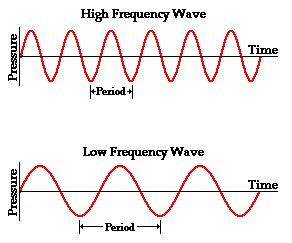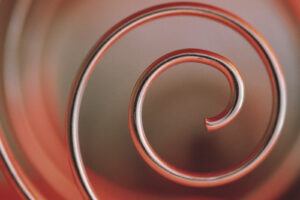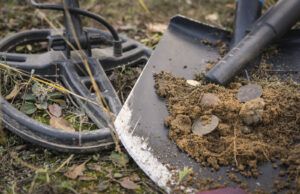Coin collecting and metal detecting sometimes go hand in hand. When I go metal detecting one of the main things I look for is old coins. Gold, silver, or copper I don’t care as long as it’s an old coin of some type. When I can find a coin while detecting it’s a thrill!
So, you might want to know how deep can a metal detector detect coins?
The best metal detectors for finding deeply buried coins have a frequency of 2 – 4 kHz ( kilohertz). If you are looking for coins that are closer to the surface a mid-range 5 – 12 kHz frequency detector will do.
That is the quick simple answer but if you want a more in-depth answer to your question then stick around. I will explain the different types of frequencies used by metal detectors and how you can use them to detect metal at different depths.
How Deep Can Metal Detectors Detect Coins?
In this article, we will be covering how low and high frequencies work. We will also be discussing how the size of the search coil that you are using affects what you can find and how deep you can detect with your metal detector. You will also learn how ground moisture and the minerals in the soil affect how deep your metal detector can detect.
I have also included a long list of the best metal detectors for coin detection at the end of the article.
Low and High Frequencies Explained

There are two types of frequencies that metal detectors use to penetrate the ground. Beat oscillation and pulse induction metal detectors use electronic frequencies and pulses that go into the ground in order for them to detect metal.
These frequencies are measured in kilohertz or kHz for short. The numbers for kHz’s range from 1-100. Frequency numbers in metal detecting are the number of times in thousands that your metal detector sends and receives electronic waves.
For example, if the frequency is 5 kHz that means your metal detector is sending and receiving 5,000 electronic waves every second. Now I will explain each type of frequency.
Low Frequency
Like I said earlier low-frequency metal detectors detect can detect coins at a much deeper range than higher frequency detectors can. That’s because the electric waves that a low-frequency detector sends out are longer than the high-frequency detectors and they can penetrate deeper into the ground much more easily.
Low-frequency detectors are better at detecting larger objects like coins than higher frequency detectors can. The higher the conductivity of metal the better they are at detecting it. One thing they are not good at is detecting small gold nuggets but good at detecting gold coins because coins typically have different types of metal included with the gold.
Silver coins are a perfect fit for low-frequency metal detectors and that’s usually the type of coin I find when I’m treasure hunting.
Unless you are using your metal detector for detecting gold nuggets then I would recommend that you get yourself a low-frequency metal detector somewhere between the frequency range of 4 and 12 kHz.
High Frequency
Higher frequency detectors of 12 kHz and beyond have shorter electronic waves so they can’t penetrate the ground as far but they are better for detecting low conductivity metals like iron and gold.
High frequency is best for detecting small gold nuggets. I wouldn’t recommend high-frequency detectors when detecting coins. But they are very precise at detecting small objects that are close to the surface.
Metal Detectors Vary With Frequency Capabilities
Not all metal detectors are made the same as you are probably aware of. Beat Oscillation detectors usually come with a single frequency operation. With this type of metal detector, you get one frequency to work with called a continuous wave.
The continuous wave machines are usually cheaper entry-level detectors. These work just fine when you’re learning the ropes but you can’t adjust or pinpoint your searches.
The more technologically advanced metal detectors will have settings on them so you can detect at different frequencies and some of them also let you detect at multi or dual frequencies at the same time! But expect to pay more for these types of metal detectors. These types of options are usually found on pulse induction detectors.
But again it all depends on how much money you have to throw at the hobby and what experience level you are at. I would say go with the single frequency detectors when starting out and scale up from there.
Coil Size Matters

The size of the search coil size is another factor you want to consider when the depth of your searches is involved.
Metal detectors have many coil sizes you can choose from and the size coil can determine at what depth you can detect to. The larger the search coil size the deeper you will be able to detect coins. But at the same time the deeper you penetrate the ground the chance of you detecting smaller objects decreases.
So your best bet if you want to scan deeper into the earth and at the same time find smaller objects then you would need to get yourself a metal detector that allows for multiple frequencies and has a large search coil. But you will be paying a higher price for these types of detectors.
Smaller search coils are much lighter weight, they work well for locating larger objects and because they are lighter they are easier to carry around if you are searching in rough rocky terrain.
How Ground Moisture Effects Detecting Deep

How much moisture is in the ground can determine how deep you can detect coins with a metal detector. With wet ground, you can detect coins much easier because the moisture will increase the conductivity of the metals.
So, many detectorists prefer wet ground over dry ground. But at the same time, deeper detection becomes more difficult on wet ground.
If you are going to be detecting in wet areas then you should make sure you have a waterproof metal detector to be on the safe side.
Can Minerals in the Soil Affect Detecting Depth
The mineral content of the soil can affect how deep your metal detector can detect. Minerals are made up of very small metal particles and these particles can sometimes confuse your detector.
If there is a high concentration of iron in the soil then your metal detector will have a hard time deciphering the iron from other metal objects and won’t be able to detect objects very accurately at deeper depths.
There are metal detectors that can adjust to the mineral concentration but these types of detectors will cost you more but then you don’t have to worry about the mineralization affecting your metal detecting.
Conclusion – How Deep Can Metal Detectors Detect Coins

I hope I have thoroughly answered your question about how deep can metal detectors detect coins? There are many factors involved in metal detecting at deeper depths. The more money you have to spend on a metal detector will determine the ease of use when detecting deep.
If you are new to metal detecting then I would recommend you get yourself a cheaper beat oscillator type metal detector and just go out and learn how to use that in the field before spending large sums of money on more souped-up versions.
No matter what kind of metal detector you have this is a fun and exciting hobby and you will make some find with practice. I will leave you with a list of some of the best metal detectors on the market today for detecting coins.
List of Metal Detectors Good For Coin Detecting
I have compiled a list of some of the best metal detectors that are great at detecting coins.
- Cabelas Adventure 5500
- Cabelas Treasure Hunter
- Cabelas Titanium Camo
- Bounty Hunter Jr.
- Bounty Hunter Tracker IV
- Bounty Hunter Quick Silver
- Bounty Hunter Gold
- Bounty Hunter UltraMag Sharp Shooter
- Bounty Hunter Landstar
- Bounty Hunter Platinum
- Fisher F4
- Fisher F5
- Fisher Labs Goldbug
- Fisher F70
- Fisher F75
- Teknetics T2 Special Edition
- Garrett Ace 150
- Garrett Ace 250
- Garret Ace 350
- Garrett Ace 250 Sports Package
- Garrett AT Pro
- Garrett AT Gold
- Garrett Sea Hunter Mark II
- Garret Infinium LS
- White’s Coinmaster
- White’s Coinmaster Pro
- White’s Coinmaster GT
- White’s MX5 Classic
- White’s MXT
- White’s Goldmaster GMT
- White’s Spector VX3
- White’s Spector V3I
- Minelab X-Terra 305
- Minelab X-Terra 505
- Minelab X-Terra 705 Gold
- Minelab X-Terra 705 Universal
- Minelab Safari
- Minelab Excaliber II
- Minelab E-Trac
- Minelab CTX 3030
- Minelab GPX 5000
That list should give you a good idea of what’s out there for metal detectors that are good for detecting coins. Find yourself a good one and start your treasure hunt.
I would like to thank you for reading and if you have any questions or comments please leave them in the comments section below. And as always Happy Treasure Hunting!
Ty this is excellent reading, this as a beginner will help me 2 get & use my detectors with ease thx again!
Thank you, Christopher. I’m glad you enjoyed the article! If you get a chance read some of my other articles that are packed full of information especially for the beginner detectorist. Check out the Beginners Guide to Metal Detector. Happy Treasure Hunting!!